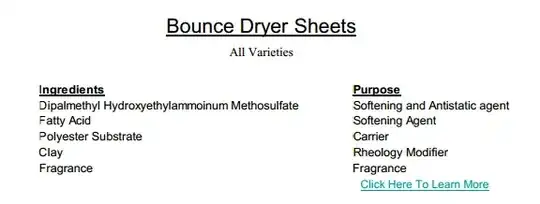Not in virtue of their chemical composition, possibly only if they specifically contain an insect repellent a particular
The CDC has a FAQ regarding insect repellents. In particular it states that:
CDC recommends the use of products containing active ingredients which have been registered with the U.S. Environmental Protection Agency (EPA) for use as repellents applied to skin and clothing.
Of the products registered with the EPA, those containing DEET, picaridin, IR3535, and some oil of lemon eucalyptus and para-menthane-diol products provide longer-lasting protection.
Also the EPA has a list of recognized active ingredients:
- Catnip oil -- EPA pesticide regulatory information (Nepeta cataria, also known as catmint) (4 products)
- Oil of citronella (3 registered products; also used in unregistered products that meet the requirements for exemption from registration)
EPA pesticide regulatory information
National Pesticide Information Center (NPIC) fact sheet Exit
- DEET (more than 500 products)
- IR 3535 -- EPA pesticide regulatory information (3-[N-Butyl-N-acetyl]-aminopropionic acid, ethyl ester) (about 45 products)
- Picaridin (about 40 products)
- EPA pesticide regulatory information
- NPIC fact sheet Exit
- p-Menthane-3,8-diol -- EPA pesticide regulatory information (also known as Oil of Lemon Eucalyptus) (10 products)
- 2-undecanone -- EPA pesticide regulatory information (or methyl nonyl ketone) (1 product)
In other words: insect repellents have a specific "active ingredient". A list of such ingredient is kept by an agencies because of safety concerns.
Now: dryer sheets basically are composed of a non-active substrate, one or more softening ingredients and a fragrance, for example Bounce:

http://www.pgproductsafety.com/productsafety/ingredients/household_care/laundary_fabric_care/Bounce/Bounce_Dryer_Sheets_-_All_Varieties.pdf
None of these components is an active insect repellent in the list provided by EPA, except possibly the fragrance -- which is left unspecified. If the dryer sheet is, for example, scented with Citronella, then of course the dryer sheet will be a repellent. PG, the company producing "Bounce" keeps a list of them which contains "Citronella ceylon natural".
Therefore, if a dryer sheet happens to be scented with an insect repellent, it will possibly repel insects. If not, it shouldn't.
